Peter MALONE
Saturday, 18 September 2021 19:59
Love/ 2014

LOVE
France, 2014, 135 minutes, Colour.
Aomi Muyock, Karl Glusman, Klara Kristin.
Directed by Gaspar Noe.
Gaspar Noe, originally from Argentina, has made a number of films in France, usually with sexual themes, many of them quite explicit. He made an impact with Irreversible, with Vincent Cassell and Monica Bellucci, a film about violation and rape, which played in reverse chronological order. He also drew on the Tibetan Book of the Dead for his rather pessimistic Japanese story of nightlife and clubs, Into the Void.
His film, Love, runs for 135 minutes, an excessive length for watching such characters and their behaviour. It was also filmed in 3-D, having some rather exploitative sexual moments, close-ups and in the audience’s face.
As regards plot, the film is fairly slight. It requires audience attention because it does not unfold chronologically and the audience is always challenged (with the help of the central character sometimes bearded, sometimes not) to appreciate which phase of the character’s life we are in.
He is Murphy, an American, living in Paris, studying film, ambitious to be a filmmaker. However, the actor, Karl Glusman, is not a sufficiently strong screen presence here to make the character interesting or convincing. He is in a relationship with his girlfriend, Omi (Klara Kristin), and they have a young son. As we go back into Murphy’s life, we learned that he had a very impulsive girlfriend, Electra (Aomi Muyock), girl about town, sexually active and adept – with the audience seeing many, many examples of this. She is highly emotional, moves in an art world, goes to clubs, becomes involved sexually with a gallery of men plus a threesome with Murphy and Omi, much to the aggravation of Murphy. On the rebound, he has an affair with Omi and she becomes pregnant. It soon becomes very clear that he can barely tolerate Omi although he loves his son.
He spends a lot of time reminiscing about his relationship with Electra which is vividly dramatised. In the present, her mother has telephoned him a number of times, concerned about the disappearance of her daughter and fearing that she has killed herself.
It could be argued that this is a serious film exploring sexuality without any limitations, using explicit action (as in Michael Winterbottom’s 9 Songs or in some films of Catherine Breillat). Noe tests limits of explicit sexual activity and censorship. The film is not so interesting in itself to warrant the length or the demands on audience attention. Which makes it a cinema oddity.
Published in Movie Reviews
Published in
Movie Reviews
Tagged under
Saturday, 18 September 2021 19:59
Saint Meets the Tiger, The
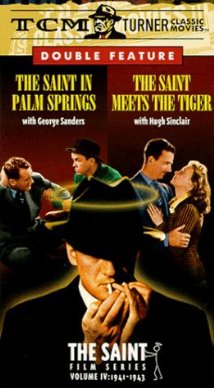
THE SAINT MEETS THE TIGER
US, 1943, 70 minutes, Black and white.
Hugh Sinclair, Jean Gillie, Gordon Mc Leod, Clifford Evans, Wylie Watson, Dennis Arundel, Charles Victor, Louise Hampton.
Directed by Paul L. Stein.
Leslie Charteris’ investigator character, Simon Templar, The Saint, was played in five films by George Sanders, two by Louis Hayward. He also played the leading many of the small-budget films in the series of The Falcon. British actor, Hugh Sinclair, played The Saint twice.
This adaptation of the Leslie Charteris story transfers the action to Britain, London, and Cornwall, the small country town, with echoes of the smugglers of the past.
Hugh Sinclair is debonair as Simon Templar. Wylie Watson is amusing as his butler who wants action, stayed in London with Templar and did not go to Chicago with the gangsters, but finds himself in action and trouble. Templar receives a phone call offering £1 million, the man coming to the door, trying to evade pursuer, but is murdered, able to mention a Cornwall town, the million pounds and The Tiger. While he contacts Inspector Teal, Templar wants to find The Tiger himself – and, at the end, reveals that he has a deal with the insurance company for 20% of the recovered gold!
Templar and Horace go to Cornwall, are accosted by newspaper reporter wanting information, Templar deciding to stay and trying to hire a cottage and mistaking Pat as the salesgirl. She is attracted to Templar – but is also quite intrepid in her joining him in the search for the villains.
There are quite a few villains in the town, having robbed the Bank of England, having hired a yacht to transport the gold to South Africa and dump it in an unused mine and claim it as a discovery.
There are various sinister characters, guns pulled, fistfights, threats, the Scotland Yard Inspector pretending to be a professor, and some split-second timing.
Templar discovers the entry to the smugglers cave through the local museum where the curator is killed. He gets onto the yacht but finds that the villains have betrayed The Tiger and are taking over the gold, Pat and Horace have already done a good job in rounding up everyone. The journalist turns out to be The Tiger, various shootings, the police arriving just on time and happy resolution for everyone.
Rather minor, especially in production values compared with the Sanders’ films. Small-budget, an easy entertainment with a Charteris story.
Published in Movie Reviews
Published in
Movie Reviews
Tagged under
Saturday, 18 September 2021 19:59
God is my Co-Pilot
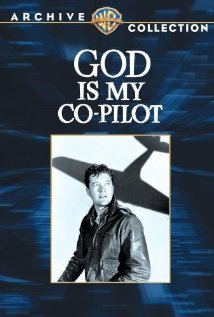
GOD IS MY CO-PILOT
US, 1945, 95 minutes, Black and white.
Dennis Morgan, Dane Clark, Raymond Massey, Alan Hale, Andrea King, Craig Stevens, Mark Stevens, Richard Loo.
Directed by Robert Florey.
In many ways, this is a standard World War II film, coming in 1945 after Warner Brothers had made a considerable contribution to the war with film starring such actors as James Cagney, John Garfield, Errol Flynn…
This is based on a book by Robert Scott, outlining his love for flying, his boyhood, growing up, training, 10 years of service before the outbreak of war, his special mission, China, flying supplies over the Himalayas, becoming involved with the attack on Japan and the bombings.
Dennis Morgan is pleasantly genial, a decent man, as Robert Scott. Raymond Massey is the commander, Andrea King his wife. There are various character actors in the roles of pilots and officials.
The standout is Alan Hale as the American missionary priest in China for over 20 years, called Big Mike, seen as a robust and friendly priest in the Pat O’ Brien tradition, comfortable with the men, teaching the children hymns, doing Chaplain work and assisting the dying, but also a good listener and with sound advice to Scott about faith, God’s presence. This is recapitulated in the finale, along the lines of Pat O’ Brien as Father Duffy in The Fighting 69th, with big Mike quoting words of inspiration and morale.
Direction is by Robert Florey, a Frenchman in Hollywood in the 1920s who directed many small-budget films and for television
1. A World War II story of 1942? Asia and the Japanese war, China? Filmed in 1944 – released before the end of the war?
2. Black-and-white photography, Macon, Georgia? (And scenes where whites and blacks seem to be mixing easily).Homes and ordinary life, the streets, newspaper headlines?
3. China, the villages, the air force bases, the Flying Tigers?
4. The aerial photography, the battles in the air, bombings on Japan, crashes, heroism?
5. A true story, the real Robert Scott? The flashbacks to the boy trying to fly from the roof, the discussions with the black friend, the religious discussion about God’s presence? Growing up, accepted the training, his 10 years of service before the war? His skills, instructor?
6. Catherine, engaged, married, her devotion, family, free to let him go to war, the news of his death, his survival?
7. Scott as a person, the opening and his not being able to fly, older? The flashbacks, the interview and the special mission, flying to South America, to Africa, to Asia, the loss of the Philippines, the transfer to China? The Flying Tigers? Scott as Air Force? The presence of Claire Chanault? The training, the missions, flying over the Himalayas with supplies?
8. After Pearl Harbor, the raids, Scott and his skills, the single-handed victory, bombs and strafing? His talking to Big Mike after this, conscious of having killed people, trying to cope? Mike, his talk about war, lives being important, making the lives significant?
9. The portraits of the men, camaraderie, skills? Johnny and his crash, his death?
10. Big Mike, the American missionary, in China for more than 20 years? Big and burly? Teaching the children to sing hymns? Presence at the airbase, the touch of the Chaplain? His discussions with Mike, friendship, persuading him to fly him back to the parish, his apprehensiveness, talking about God – and coming out of the clouds? As a priest, his advice, attending to the sick? The importance of the discussions with Scott, Faith? The finale and his voice-over and morale boosting at the end?
11. Claire Chenault, his experience, command, friendship with Scott, orders for the men, allowing Scott to go with the last plane?
12. A contribution to the war effort – and morale boosting in the final months of World War II?
Published in Movie Reviews
Published in
Movie Reviews
Tagged under
Saturday, 18 September 2021 19:58
Around the World in 80 Days/ 2004
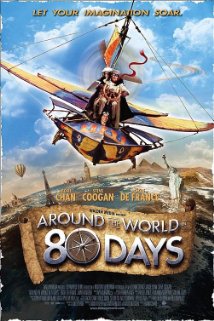
AROUND THE WORLD IN EIGHTY DAYS
US, 2004, 120 minutes, Colour.
Jackie Chan, Steve Coogan, Cecile ance, Jim Broadbent, Ian Mc Neice, Adam Godley, Ewan Bremner, Richard Branson, Macy Grey, Arnold Schwarzenegger, Maggie Q, Summo Jung Kam- Bo, Rob Schneider, Luke Wilson, Owen Wilson, Mark Addy, John Cleese, Will Forte, Kathy Bates.
Directed by Frank Coraci.
Better to sight one’s sights rather lower for this pantomime version of Jules Verne’s classic novel. It has been co-produced by Jackie Chan who takes on the role of Passepartout (ensuring that one of the major stops on the way is in a Chinese village), the roguish hero who accompanies the rather uptight Phileas Fogg on his epic journey. British comedian Steve Coogan is Fogg and plays him ultra-seriously. It is left to Chan to offer the lighter touch (and some martial arts acrobatics). Cecile de France is the artist who adds glamour to the proceedings.
The film is amusing but often rather silly for adults. The slapstick (plenty of it) is for the younger audiences. It also evades many of the difficulties of how Fogg and co actually got around the world so quickly when they seem to have been bogged down in Turkey or India or China and then, with little or no explanation have reached their next destination.
Fogg has invented some eccentric machines which offers some fascination, especially building the flying machine from the transatlantic steamer after advice from the Wright Brothers (a funny cameo from Owen and Luke Wilson as Orville and Wilbur cycling through the desert). There is also a subplot where the entertainingly dastardly Lord Kelvin (Jim Broadbent giving it the right touch of exaggerated villainy) employs a female Chinese general to pursue Passepartout who has taken back from the Bank of England a jade Buddha stolen from his village.
Part of the entertainment for the adults is the range of guest appearances, including a glimpse of Richard Branson with a hot air balloon, Arnold Schwarzenegger sending himself up as a Turkish potentate, Rob Schneider as a smelly San Francisco homeless man and Kathy Bates as Queen Victoria.
Not the definitive version.
Published in Movie Reviews
Published in
Movie Reviews
Tagged under
Saturday, 18 September 2021 19:58
Biker Boyz
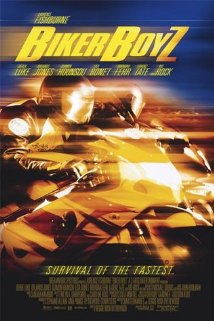
BIKER BOYZ
US, 2003, 110 minutes, colour.
Lawrence Fishburne, Derek Luke, Orlando Jones, G man who Djimon Hounsou, Lisa Bonet, Brendan Fehr, Larenz Tate, Kid Rock, Rick Gonzalez, Meagan Good, Sally Richardson- Whitfield, Vanessa Bell Calloway.
Directed by Reggie Rock Bythewood.
Biker Boys is a film about motorcycling and racing gangs.
Depending on interest, it is a narration with many racing interludes or, it is many racing sequences with some narrative interludes.
For fans, the filming of the races, editing and pace is adrenaline pumping.
As regards drama, there are a variety of persons in the gangs, the main character being Smoke, Laurence Fishburne, the long time champion. He has a great number of followers as well as enemies. When a young man, Kid, Derek Luke, wants to assert himself, wants to challenge Smoke, there are revelations from his concerned mother that Smoke is actually his father and she wants Smoke to stop her son racing. He forms a local group, with a white rider as well as a Hispanic rider. Ultimately, there is a race between the two rivals with Smoke conceding his son’s victory and the son allowing his father to keep the trophy for some time.
An African- American story, a biking story, which will be of interest mainly to bike riders.
1. A biking story, an African American story, the American city, the bikie gangs, racing, family story?
2. The city, the streets, the races and the venues, homes and apartments, shops? The city locations? The musical score?
3. The drama and the narrative, the intersecting of the bikes scenes?
4. The bikes scenes, editing, pace?
5. The narrative? Smoke and his story, champion in the past, his girlfriends, Anita being pregnant, her marrying, the husband’s loyalty, not telling Smoke? His leadership, his followers, the death of Anita’s husband? Attitude?
6. Kid’s story, 18, his father’s death, aggressive, against Smoke, his friends, the white man, the Mexican, the discussion about their forming a group, the board and acceptance, the recruits, multi-racial? Going into the white territory – and the leader coming, the confrontation, wanting double his money back? Kid and his plans?
7. Characters, Anita and her life, hold over her son, getting him to promise not to race? Kid and his girlfriend, tattooed, moving in with her?
8. Dogg, champion, rivalries, the races? Bitterness?
9. The role of the women with the gangs, relationships, Smoke and his girlfriend?
10. Rivalries, the revelation of the truth, the effect on Smoke, on Kid?
11. The buildup to the race, in the countryside, Kid winning, Smoke relinquishing his trophy, Kid allowing him to keep it for a while?
12. The overall impact of the racing story, of the human drama?
Published in Movie Reviews
Published in
Movie Reviews
Tagged under
Saturday, 18 September 2021 19:58
Ask Me Anything
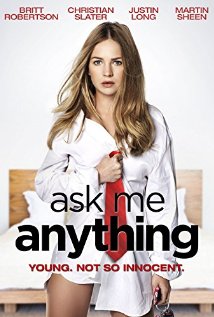
ASK ME ANYTHING
US, 2014, 100 minutes, Colour.
Britt Robertson, Christian Slater, Justin Long, Molly Hagan, Andy Buckley, Robert Patrick, Kimberley Williams- Paisley, Max Carver, Sharon Omi, Gia Mantegna, Martin Sheen.
Directed by Allison Burnett.
Ask Me Anything is based on a novel, Undiscovered Gyrl, by Allison Burnett wrote the screenplay for and directed this film. It is the picture of a troubled teenager, the problems in herself, with her parents, sexuality and promiscuity, trying to make an independent life. And she decides not to go to College, a teacher advising her to get some structure and discipline in her life by writing a blog, which she does, anonymously, confiding all her experiences to the blog and to her readers –, and, later, the Martin Sheen character indicates that this is a problem with teenagers, wanting attention, to be attractive.
Britt Robertson is Katie, and gives a persuasive performance. Molly Hagan is her mother with alcoholic husband, Robert Patrick, and is about to marry a lawyer police officer, Andy Buckley. Justin Long is a university lecturer with whom Katie has an affair even though he is engaged. Christian Slater is a wealthy businessman who employs her to look after his child and who has an affair with Katie. Martin Sheen is a bookshop owner from whom Katie seeks good advice.
All goes well with this exploration of Katie’s character, her voice-over narration, the entries in the blog. She is pregnant, is considering having an abortion, moving out of home… The last five minutes of the film are quite unexpected and have made many commentators on the film very angry, saying that it spoils all that has gone before. Whether one likes the ending or not, it is important to ask why the writer-director included it – and listen to Katie’s words in her final blog, that she had to move out and to find a new life. She disappears, her mother blogging to get leads, hiring a private detective who interviews all the significant people in her life, finding that her blog mainly tells the truth with some details changed. It would seem appropriate that she has entirely disappeared to make her own life.
1. The title? Undiscovered Gyrl? The title of the blog?
2. The director, writing the screenplay, adapting his novel? A visual interpretation, especially with the blog entries?
3. A teenager story, a young girl, typical behaviour, her commentaries? Home, the relationship with her father, going to visit him, his drinking? Her mother’s partner and ridiculing him as “the moustacche“? Her age, deciding not to go to college, the reasons? The teacher urging structure and urging the blog – and later meeting her in the street? Her friends? Dan and the affair, Rory and the relationship, sex and brutality, the promiscuity? Communicating via her blog?
4. Her character, the narration, revelation of her interior life and mooods, her confusion?
5. Dan, his age, university lecturer, his relationship with his girlfriend, engaged? The sexual encounters and their effect, casual, his moving, 30 minutes away, Katie not having a car? Cut off, the phone call, the girlfriend answering, having the use of the car, driving out, the sexual experience, then cutting it off, his own engagement? The effect on Katie?
6. Rory, her boyfriend, watching TV, sexual experiences, his violent reaction, later talking together?
7. Not going to college, getting a job, seeing Glenn with his notice, the bookshop, his welcome, the discussions about literature, payment? The revelation about his being a sex offender? Her phoning him, giving up the job? The later visit, asking him about the truth, his explanation of what he was like as young, the prostitute, drinking, the violence, imprisonment? His love for books and art, welcoming Katie back, the long talk, his calm advice, about the abortion, about life, about guilt and regrets, offering her the room? Bringing up her child?
8. Paul, the phone call, his wife, the baby, getting the job, her loving care for the child? Paul and his age, at work, money, his wife not wanting another child, going back to work? Katie and her attitude towards Paul, the Valentine gift, the sexual encounter and the touch of seduction, talking, Paul and his list about happiness, the commentary on each of the points, a touch pessimistic? Cutting of the relationship with him?
9. The older student, their meetings, talk, his frank attitudes in explaining her to herself?
10. The father, drinking, the past, sportswriter, not finishing the book? Leaving, his resentment towards his wife? His relationship with the new partner, the visits, the presents, the box of codes, his collapse, hospital?
11. The flashbacks during the sexual encounters, the memories – abuse? The sending of the letter, beginning to understand better, the effect?
12. The visit to the counsellor, her writing the false letter in her mother’s name, the further interviews, the suggestion to write the letter to the abuser, her posting it?
13. Discovering she was pregnant, the effect? Possibilities of abortion, keeping the baby?
14. The blog, confiding, the variety of responses, angers when she did not post?
15. The final resolution, finishing the blog, saying she had to find a life?
16. The impact of the final five minutes, her mother using the blog to find leads, the private detective, interviewing all the person in her life, the comments about accuracy, some inaccuracies?
17. The tone of the final five minutes – in a sense, moral cautionary tone for teenagers?
Published in Movie Reviews
Published in
Movie Reviews
Tagged under
Saturday, 18 September 2021 19:58
Foxcatcher
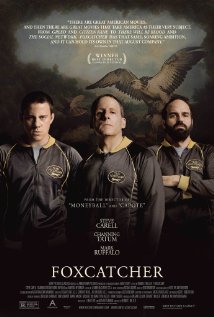
FOXCATCHER
US, 2014, 134 minutes, Colour.
Steve Carell, Channing Tatum, Mark Ruffalo, Vanessa Redgrave, Sienna Miller, Anthony Michael Hall, Guy Boyd.
Directed by Bennett Miller.
Foxcatcher has been very well reviewed and nominated for many awards. It certainly is a very interesting and well-made film, worth seeing for its characters, power plays, American wealth and a film about Olympic wrestling.
There is an opening scene with people riding to hounds in pursuit of a fox. There is both realism and symbolism. Foxcatcher is the name of a company, set up by John Du Pont, the heir to the du Pont business millions. It was a company for the training of wrestlers, with the intention of training athletes for the 1988 Seoul Olympics, Team Foxcatcher.
At the centre of the film is a young man, Mark Schultz, quite a single-minded young man, intent on his wrestling. He is something of a loner, goes to training in a gym and is managed by his older brother, Dave. The two brothers had won Olympic called at the 19th 84 Los Angeles Games.There is a certain rivalry but Dave is a more assured man, happily married with children.
Into their lives comes John du Pont, multimillionaire, with an interest in wrestling and especially in Mark Schultz and a summons to his Pennsylvania estate, plane ticket and helicopter reception provided. He makes Mark an offer which he cannot and does not refuse, coming to Pennsylvania, joining Team Foxcatcher, working with a number of elite wrestlers. While the film is about wrestling and there are quite a number of sequences which illustrate techniques, this is not solely a sports film. Soon John du Pont is inviting Dave Schultz to join the group. He is reluctant but is finally persuaded.
While the director, Bennett Miller, won the best director award at the 2014 Cannes film Festival, this is very much an actors’ film. Channing Tatum is quite intense as Mark Schultz, one of his best performances, a serious young man, not relating very well to others, finding in John Du Pont not only a sponsor but something as a father-figure. Mark Ruffalo, a fine actor in many a film, is certainly very good as Dave Schultz, happy to work with his brother, wary of John du Pont, yet working within the Foxcatcher Team, only to be the victim of the intensity.
The surprise is the performance of Steve Carell, best known as a comedian, often zany and loopy, but here very serious as John du Pont. His make up, especially his nose, given great prominence and often filmed from a low angle, suggest, at times, a bird of prey. Humour is not one of his qualities. Everything is serious, everything is intense, including his exercise of power to persuade athletes to join his Team, his joining in in their training, fancying himself as one of them. He is not only a father figure for Mark but also a sinister mentor.
The Du Pont family traced its lineage back to the War of Independence, with pictures and other mementos in their mansion. John du Pont takes wealth for granted, has a range of assistants who do his bidding, summoning people to meetings, enforcing his regimes. He has a strong and strange relationship with his dominant mother, played by Vanessa Redgrave, who considers wrestling a lowly sport, herself very involved with horse breeding and training.
But, it becomes all too much for John Du Pont, leading, for those who do not know the true story, to a surprising and jolting ending.
While the film is a picture of the sport of wrestling in the United States, it is also a significant piece of Americana, the status and power of the wealthy, exercise of dominance, with tragic results.
1. Awards and acclaim? Critical success?
2. The title, the foxhunting sequences, the portraits in the two point house, the horses on the property? The title of the wrestling company? US wrestling? The catch cry?
3. Audience interest in wrestling, Olympics wrestling, competitiveness? Mark and the opening sequences, his training with the dummy, the bouts, going to the office, his relationship with his brother, Dave? Dave and the training, his own achievement at the Olympics? The focus on wrestling and the details, the moves, seeing them in action, hearing the explanations? Wrestling terms and competition? Mark and Dave, the interest of Du Pont, his own interest in wrestling, his being in the bout and competition (and the payment allowing him to win), the award, talking to his mother and her disapproval? The success of the sport? The routines? At national and international level? Audiences seeing wrestling, understanding, learning? The success of the film as a wrestling film?
4. The film as drama? The portrait of Mark Schultz, bodybuilding the fight with the dummy, his gold medal at the Olympics, his talk to the children, at home, a loner, his meals, the shops, no women in his life, no explanation? The sexual implications? His being interviewed and the screenplay supplying information about his background, his parents, growing up? The bond with his brother, training, hard, giving his brother the blood nose? Both winners?
5. The importance of Dave, his success, his love for his wife and children, at his centre, the officials visiting, training his brother, his care for the younger brother? The good man?
6. Mark receiving the call from Du Pont, the invitation, the plane, the helicopter, meeting Du Pont, the interview, Du Pont as odd and sinister, his look, his manner, his words? Du Pont inviting Mark to join him, Mark’s acceptance, the house, Mark’s quarters, the training area? The gradual building up and revelation of the bond between the two men? Some mutual dependence? The discussions, the training, Du Pont and his idea, the Foxcatcher team? The men joining, ambitions, the squad and their lifestyle, the training and the manoeuvres, success?
7. John as a character, the background of Valley Forge and the revolution, Washington, the portraits in the house, the sense of history? The background of armaments, the Du Pont wealth? John and his age, a loner? The sexual implications? The dominance of his mother, her care for the horses, the interview with her and her being against wrestling? Her later visiting and seeing one of the bouts?
8. The glimpse of Mrs Du Pont, with the horses, her age and experience, will, wrestling being an inferior sport? Her watching? The impact of her death and John going to her funeral?
9. Mark and the effect of the experience, training, values, his memories of his Olympic medals? With the team, John’s support, Mark seeing him as a father figure? Changes, the regime, training, performing, bouts, Du Pont’s treatment of Mark?
10. Dave, his work? The Olympic medal? His refusing Du Pont? Change, his arrival? Traning?,
11. Du Pont, the team, his imagining he knew more about the sport, the exercises, the bouts? Yet his introversion, sitting alone? The falling out with Mark, treatment?
12. Mark, his reactions, the binge? His having to return to training? Weight? The challenge?
13. The Summer Games, preparations for the 88 Olympics, the different bouts, DuPont? and his presence and involvement, manic?
14. The fights, Mark and his success, the tension? Leaving, going his separate way?
15. Du Pont, the reaction to Dave, His arrival? Shooting him? His wife and children watching?
16. Du Pont and his entourage, bodyguards, protectors, business managers and consultants, pilots?
17. Du Pont his madness, going to prison, his death in prison? Dave and his being installed in the Hall of Fame? Mark, his subsequent life – and his being
consulted the film?
Published in Movie Reviews
Published in
Movie Reviews
Tagged under
Saturday, 18 September 2021 19:58
Cat and the Fiddle, The

THE CAT AND THE FIDDLE
US, 1934, 88 minutes, Black and white and Colour.
Ramon Novarro, Jeanette Mac Donald, Frank Morgan, Charles Butterworth, Jean Hersholt, Vivienne Segal, Frank Conroy.
Directed by William K.Howard.
The Cat and the Fiddle is not a well-known MGM musical of the early 1930s. It is based on a Broadway play by Jerome Kern and Otto Harbuch, adapted by the team of Bella and Sam Spewak. Music and lyrics by Jerome Kern and Oscar Hammerstein.
Jeanette Mac Donald had made films with Maurice Chevalier and the next year was about to begin her series with Nelson Eddy. Here she is teamed with Mexican star, Ramon Navarro. He had appeared as Ben Her.
The plot is slight, he, Victor, composer, penniless, in Brussels, depending on the meeting arranged by his professor, Jean Hersholt, with an entrepreneur, Daudet, played by Frank Morgan. In a hurry, To gets into a taxi with a visiting American, singer and composer, Shirley, Jeanette Mac Donald. They do not get on well at all – and the taxi driver takes his music because he is not able to pay. As it turns out, each of the characters lives in an adjacent apartment and they clash with piano playing.
Nevertheless, Victor falls in love with Shirley, helps with her composition and is ready to sacrifice everything for her. He finds the taxi driver, retrieves his music, and then bowls the impatient entrepreneur who was persuaded to give him an audition. A crowd of fellow-musicians comes to listen, Shirley arrives for her appointment with the porfessor, looks in through a high window and is left stranded hanging. The entrepreneur gives Victor a chance, but he becomes infatuated with Shirley.
The couple seem to manage together, each falling in love, Victor trying to compose, and then he accompanies Shirley to Paris where her song is a great hit, sung all over the world in different languages, she becoming wealthy and supporting him, with Victor suffering writer’s block.
He pretends to spurn Shirley and goes back to Brussels to finish his operetta. She is hurt and, in the meantime, is courted by the entrepreneur who proposes and she accepts.
There is trouble with the production when the star of the show makes an advance and Victor is discovered by the wealthy husband, the producer, and she opts for him and comfort, and he withdraws his financial support. The theatre manager is after Victor who gives him a false cheque. Victor finds a substitute leading lady who is older and alcoholic.
In the meantime, the rather engaging character, Charles, Charles Butterworth, an eccentric man who gives Victor the money to get his portfolio back from the taxi driver but ask for lessons on the harp, sees that Shirley is about to marry, he hurries to see her, to try to persuade her to take the leading role – she refuses.
When all is about to fail, Shirley arrives, sings the role on the insistence of the entrepreneur – but, as the performance continues, Victor and Shirley fall in love again and the entrepreneur leaves.
The surprise at the end of the film is that it moves into the final stage sequence in colour, one of the earliest colour sequences at MGM.
Published in Movie Reviews
Published in
Movie Reviews
Tagged under
Saturday, 18 September 2021 19:58
Hullabaloo
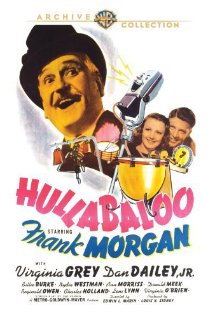
HULLABALOO
US, 1940, 78 minutes, Black and white.
Frank Morgan, Virginia Grey, Dan Dailey, Billie Burke, Nydia Westman, Ann Morriss, Donald Meek, Reginald Owen, Charles Holland, Leni Lynn, Virginia O' Brien, Curt Bois, Sarah Haden, Larry Nunn.
Directed by Edwin L. Marin.
Honolulu is quite an entertaining brief film from the 1940s, an MGM support feature, a star vehicle for Frank Morgan after The Wizard of Oz, as if the Wizard has a film all to himself.
The setting is radio, difficulties in studios, people auditioning, managers wanting new ideas, owners of companies wanting advertising opportunities. There is a quite a deal of observation as well as poking fun at executives, company owners…
Frank Morgan is his exuberant self, mainly spruiking his career, as if he had succeeded in all kinds of fields, comedy, Broadway, opera... He has a new program, in which he does all the voices himself. While this gives him some versatility, when he finally gets his program, he relies on MGM star voices and lip syncs excellently for Clark Gable, Hedy Lamarr, James Stewart…
The film opens with some auditions, singer Charles Holland, African- American, singing a Stephen Foster song followed by Virginia O’ Brien with the same song and her perpetual technique of not offering any expression, relying on her voice and body movement. There is a repetition of this at the end. It is interesting to see the opportunity for an audition for an African- American man, a bellhop. Charles Holland sings well but did not have a film career.
Also wanting an opportunity for an audition, to dance, is Virginia Grey. She becomes friendly with Frank Morgan who has three ex-wives, avoiding alimony, and three children, one from each wife. There is a set up in a hotel where each of the wives arrives with each child – including Virginia Grey. The wives are played in their particular style by Connie Gilchrist, Billie Burke as the daffy one, and Sarah Haden, Andy Hardy’s aunt at this stage, and she is opposite to this particular quiet screen image.
Also at the radio station is a champion golfer, Dan Dailey, engaged to the owner of the station who does not approve of him. He is determined to get a new program, employs Frank Morgan – only to discover that his act is too much like Orson Welles famous radio broadcast of The War of the Worlds, and the film shows crowds of people listening, panicking.
One of the executive’s is played by Reginald:, Owen, also trying to promote a program with comedy while his counterpart, Curt Bois, is strong on classical music.
Donald Meek has a very good role as the brother-in-law of the widow who half owns the medical company. She becomes infatuated with Morgan, wanting him to voice Charles Boyer, and stood up at the altar. He is determinedly against new programs – but has a conversion experience and then becomes very enthusiastic.
The grand climax features an improvised program after Morgan has promised the presence of various MGM stars, including Mickey Rooney and Claudette Colbert, only to pretend that they are stranded at an airport because of a storm. Morgan handles the whole program, and includes his children with various acts – all a huge success.
A pleasant visit to the past.
Published in Movie Reviews
Published in
Movie Reviews
Tagged under
Saturday, 18 September 2021 19:58
My Summer in Provence/ Avis de Mistral
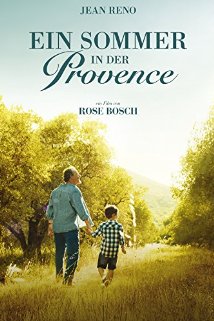
MY SUMMER IN PROVENCE/ AVIS DE MISTRAL
France, 2014, 105 minutes, Colour.
Jean Reno, Anna Galiena, Chloe Jouannet, Hugo Dessioux, Aure Atika,Lucas Pelissier, Tom Leeb.
Directed by Rose Bosch.
My Summer in Provence is a familiar story, an absent father, a mother seeking a job, three children taken on holidays to their grandfather’s house and learning something of life and relationships.
Jean Reno is the gruff grandfather whose daughter walked out on him 17 years earlier and has not kept in contact with his family, persuaded by his kind wife, Anna Galiena, to take on the children for the summer. The children are a boy, in mid-teens, the girl was almost a textbook of politically correct environmental precepts but spoilt and living her convictions in theory rather than practice, and a little boy who is deaf.
As the summer goes on, the little boy bonds with his grandfather working in the olive groves. The boy has to deal with his hormones and attraction to tourist girls and the proprietor of an ice cream shop. The girl is infatuated with a man with a pizza van but who is in fact the local drug dealer.
Of interest to older audiences is the group of hippies from the past, the grandfather and grandmother being in their group, who travelled the world, believed in freedom, drugs, free love – and several of them are still travelling with the same beliefs.
It is the scenery and the South of France that makes the difference for this film.
1. A family story, the different generations, the influence of the countryside, when outside Paris, relying on getting to know people, the effect of experience?
2. The colour photography, Avignon, the countryside, the town, the home, the farm, the beach? The summer setting? The musical score? The songs, The Sounds of Silence, Let the Sunshine in, Wandering Star and other songs of the past?
3. The familiar scenario, the father walking out, on later trying to contact by Skype and the children’s resentment? The mother looking for a job in Canada? The background of her choosing her husband and leaving her father and his 17 years of resentment? The kindly grandmother? Bringing the unwilling children to the country, on the train, the complaints, wanting the city, friends, Facebook…? The gruff grandfather and his initial hostility?
4. The arrival, grandfather’s reaction, the drive, and packing, the mattresses and the dust, the room, looking for a connection, television? The meal and their criticisms? The grandfather and his offhand reaction? The grandmother and her continued concern and love?
5. Adrien, his age, school, city boy, and the girls, seeing Magali, the tourist girls? Lea, her age, spoilt, eye on the boys, especially the pizza man, lazy, resentful? But full of comments about the environment and healthy food? Theo, deaf, his age, cheerful, sign language, the other two taking care of him, translating?
6. The outings, at the beach, the bull run, the music, parades? Ice cream, pizza?
7. The work on the farm, the olives, the planting, the watering, Theo enjoying it, bonding with his grandfather? The grandfather being awarded the prize for the envelopes?
8. The role of the old hippies, happy memories of the past, the international travel, drugs, free, the grandchildren with a new view on their grandparents? The friendship, the singing, the memories?
9. Lea, her grandmother’s advice, the right boy, going with the pizza man, with the bulls, his flirting, taking her to the beach, sex, drugs? The grandfather learning that he was a drug dealer, going to the beach, threatening him, his leaving? Rescuing Lea, her health?
10. The bonding, by the end of the holiday, returning home, the mother writing, the persuading her to talk to her father? The prospects of the future?
Published in Movie Reviews
Published in
Movie Reviews
Tagged under